Ministry of Science & Technology
Council of Scientific and Industrial Research (CSIR) Year End Review 2024
Hon’ble Vice President, India, inaugurates 83rd Foundation Day Celebrations of CSIR
CSIR Tableau on Kartavya Path showcased India’s Purple Revolution through Lavender Cultivation
India’s first indigenously built Fuel Cell Catamaran unveiled
Successful Flight Tests of High-Altitude Pseudo Satellite
Development of Non-Invasive Blood Test for Early Breast Cancer Detection
Launch of CSIR’s National Mission on Sustainable Packaging Solutions
Launch of Multi-Millet Buns in Collaboration with McDonald's India
Development of Rapid Test for Sickle Cell Anaemia
CSIR-IIP & Airbus Ink Pact for Green Aviation
CSIR organized IISF 2024 in IIT Guwahati
Three CSIR Scientists awarded with Rashtriya Vigyan Puraskar 2024
प्रविष्टि तिथि:
27 DEC 2024 11:13AM by PIB Delhi
Significant Scientific & Technical Attainments during the year
The indigenous road construction technology “REJUPAVE” developed by CSIR-Central Road Research Institute (CSIR-CRRI), to construct high altitude bituminous roads at low and sub-zero temperature conditions, was successfully utilized by the Border Road Organization (BRO) for high-altitude bituminous roads construction on China Border in state of Arunachal Pradesh. The technology has also been used by the BRO’s project Vijayak in Kargil to construct high-altitude bituminous roads on the Drass-Umbala-Sankoo Road in Drass, Ladakh.
- India’s First National Highway Steel Slag Road section on NH-66 Mumbai-Goa National Highway inaugurated
- V.K. Saraswat, Member (S&T), NITI AAYOG inaugurated India’s First National Highway Steel Slag Road section on NH- 66 Mumbai-Goa National Highway on 15 January 2024. JSW Steel, under the CSIR-CRRI technological guidance, has constructed the 1 km long four lane steel slag road section on Indapur-Panvel Section of NH-66 Mumbai-Goa. For construction of this road around 80,000 tons of CONARC Steel slag were converted as processed steel slag aggregates at JSW Steel Dolvi, Raigad plant.
The construction of Shri Ram Mandir, Ayodhya, has been technically assisted by CSIR. The "Surya Tilak" system has been designed by CSIR-Central Building Research Institute (CSIR-CBRI) and it will channel the ray on the idol's forehead from 12 noon for about six minutes. Every Ram Navami, an intricate network of lenses and mirrors will be used to channel a ray of sunlight in the sanctum sanctorum of the Ram temple in Ayodhya and converged on the forehead of Ram Lalla as "Surya Tilak". The Ram Mandir in Ayodhya has been meticulously engineered to endure seismic events that occur once every 2,500 years.
- CSIR-NIO, Goa launches underwater vehicle, C-Bot, to monitor coral reefs
Dr N Kalaiselvi, Director General, CSIR launched the coral monitoring autonomous underwater vehicle, Coral Reef Monitoring and Surveillance Robot, or C-Bot, for long-term monitoring of coral reefs, developed by CSIR-National Institute of Oceanography (CSIR-NIO), Goa. The C-Bot, can reach depths of 200 meters.
- India's first Lithium battery recycling pilot facility Inaugurated
India's first Lithium Battery Recycling Plant installed under CSIR's Bulk Chemical Mission at CSIR-National Metallurgical Laboratory (CSIR-NML), Jamshedpur was inaugurated by Dr. V.K. Saraswat, Member of NITI Aayog. The initiative aligns with the Atmanirbhar Bharat vision, contributing to self-reliance in battery manufacturing. The Lithium Battery Recycling Plant at CSIR-NML is poised to contribute significantly to India’s efforts towards environmentally responsible and resource-efficient technologies.
- Successful Flight Tests of High-Altitude Pseudo Satellite
CSIR-National Aerospace Laboratories (CSIR-NAL) successfully flew a prototype of a new-generation unmanned aerial vehicle (UAV), High-Altitude Pseudo Satellite (HAPS) that can fly at great heights, about 20 km from ground, runs entirely on solar power, and can remain in the air for months. The primary utility of HAPS vehicles is in the field of surveillance and monitoring, and other situations, like disaster management, wherein it can be very useful.
- CSIR in partnership with KPIT, developed India’s first indigenously built Fuel Cell Vessel
Hon’ble Prime Minister, Shri Narendra Modi virtually launched India’s first indigenously developed hydrogen fuel cell catamaran built by the Cochin Shipyard Limited (CSL) based on the Fuel Cell Technology of CSIR and KPIT. Built at a cost of Rs18 crore, the ferry will be handed over to the Inland Waterways Authority of India by the CSL after rigorous trials.

- CSIR-NIIST Develops Sustainable Technology for Organic Wastewater Treatment
The CSIR-National Institute for Interdisciplinary Science and Technology (CSIR-NIIST) has made a breakthrough by developing and patenting a sustainable technology for treatment and disposal of organic waste water discharged by hotels, restaurants, catering units and similar businesses, which is a big problem in cities, especially in locations without proper sewerage network.As a sustainable solution, the on-site waste water technology, named NOWA, has the advantage of recovering valuable resources like reuse quality water, bio-energy and organic manure and soil conditioner from waste-water.
- CSIR-NEIST Discovers A New Flowering Plant, "Begonia Narahari" in Arunachal Pradesh; named 'Narahari' to honor former Director
CSIR-North East Institute of Science and Technology (CSIR-NEIST), Jorhat in collaboration with University of Science and Technology Meghalaya (USTM), have discovered a new flowering plant named “Begonia Narahari” in the Lohit district of Arunachal Pradesh.After meticulous examination and comparison with known Begonia species worldwide, the researchers confirmed its identity as a previously undescribed and new species within the genus Begonia.The species has been named "Begonia Narahari", to honour Prof G NarahariSastry, the former director of CSIR-NEIST, Jorhat, for his remarkable efforts in establishing the Germplasm Conservation Centre for the bio-resources of Northeast India and his dedication to the region’s welfare.
- CSIR-CDRI Introduces Distinctive Oral Pill for Accelerated Fracture Healing
CSIR-Central Drug Research Institute (CSIR-CDRI) has come out with an oral pill to help fasten the process of healing after a fracture. The institution is currently working on two bone healing entities, namely CDRI-1500 and CDRI-399. Necessary approvals from drug regulatory bodies have been received and the phase-1 clinical trials for CDRI-1500 will begin soon.
CSIR-Institute of Microbial Technology (CSIR-IMTech) has discovered a molecule which could lead to developing a cure for Parkinson's, a neurodegenerative disease. The study, till now only carried out on mice, has shown promising results for one molecule. The researchers have filed an international patent for four molecules that have potential to provide cure for the disease.
CSIR-NAL handed over the third and final set of engine bay door (EBD) parts for the Tejas Mk1A, to Hindustan Aeronautics Limited (HAL). HAL had entered a Transfer of Technology (ToT) agreement with CSIR-NAL in November 2023, to manufacture Bismaleimide (BMI) EBD for the series production of Light Combat Aircraft Tejas Mk1A.
- CSIR-CCMB develops new rice variety immune to Yellow Stem Borer
CSIR-Centre for Cellular & Molecular Biology (CSIR-CCMB) and ICAR-Indian Institute of Rice Research (IIRR) in collaboration have developed a rice variety resistant to Yellow Stem Borer (YSB), a major pest in India that can cause up to 60% loss in rice production. The new research addresses these gaps by identifying key biomolecules involved in YSB resistance. This breakthrough is expected to significantly reduce the dependency on chemical pesticides, enhance rice yields, and provide a persistent solution to the YSB threat throughout the rice growing season.
- CSIR-CMERI Unveils Electric Tiller for Sustainable Farming
Electric Tiller designed and developed by CSIR-Central Mechanical Engineering Research Institute(CSIR-CMERI)was introduced by the DG, CSIR, Dr. N. Kalaiselvi in Durgapur on 25May 2024. Tailored for small to marginal farmers, constituting over 80% of India's farming community, the tiller promises reduced operational costs and promotes sustainable farming practices. The Electric Tiller prioritizes user comfort and environmental sustainability, boasting enhanced torque, reduced vibration, and zero exhaust emissions. Equipped with electronic controls and ergonomic handling, the Electric Tiller marks a significant milestone in agricultural machinery, aiming for a more sustainable and efficient farming future.
- CSIR-NAL Advances Towards High-Altitude Platform (HAP) Development
CSIR-NAL successfully test-flew a subscale High-Altitude Platform (HAP) to 25,000 feet on 7May 2024. HAPs, operating at 18-20 km above Earth, offer capabilities like surveillance, earth imaging, and telecommunications at a fraction of satellite costs, complementing satellite technology. Extensive ground tests and an additional sub-scale flight are planned over the next 18 months to refine the full-scale HAP prototype, aiming for unprecedented endurance and performance in high-altitude platforms.
- CSIR-CIMFR’s Controlled Blasting Process used in the construction of Tunnel-2, the longest tunnel in Mumbai Suburban Railway Network
CSIR-Central Institute of Mining and Fuel Research (CSIR-CIMFR) guided the Mumbai Railway Vikas Corporation (MRVC) with the rock blasting process during the construction of Tunnel-2 (Wavarle Tunnel), the longest tunnel in the Mumbai Suburban Railway Network, as part of the Panvel-Karjat railway project under the Mumbai Urban Transport Project 3 (MUTP-3).
- CSIR-IICT Develops new process to Manufacture High-Energy Rocket Propellant
CSIR-Indian Institute of Chemical Technology (CSIR-IICT) in collaboration with Premier Explosives Ltd., has successfully developed an indigenous process to produce the key material used in CL-20, a high-energy propellant. CL-20 offers superior performance over traditional propellants like RDX and HMX, boasting a higher energy release and better oxidiser-to-fuel ratio, crucial for rockets and missiles. The breakthrough enables India to achieve self-sufficiency in propellant development for defense and space applications, marking a significant stride towards technological independence.
- CSIR-CCMB Develops Non-Invasive Blood Test for Early Breast Cancer Detection
CSIR-CCMB and Regional Cancer Centre (RCC), Thiruvananthapuram have identified a cost-effective, non-invasive method to detect breast cancer using a drop of blood. MicroRNA (miRNA) signatures have been analyzed in hundreds of cancer samples, identifying 439 miRNAs linked to invasive breast cancer, with 107 as potential biomarkers for different types and stages of the disease.
- CSIR-IGIB and LVPEI Develop Enhanced CRISPR-Cas9 System for Precision Genome Editing
CSIR-Institute of Genomics and Integrative Biology (CSIR-IGIB) and LVPEI, along with collaborators, have developed an enhanced CRISPR-Cas9 based genome editing system, which is more precise and efficient than existing technologies.The edited and validated Cas9 protein from Francisellanovicida (FnCas9), creating enFnCas9, showed normal protein expression and no detectable off-target alterations, proving the efficacy and safety of the enFnCas9-based CRISPR tool for precise genome editing. This development is a significant step towards therapeutic applications for genetic disorders in the Indian population, highlighting the importance of advancing gene correction tools for clinical use and market authorization.
- CSIR Launches National Mission on Sustainable Packaging Solutions
The CSIR has launched a National Mission on Sustainable Packaging Solutions. The mission, coordinated by CSIR-NIIST, Thiruvananthapuram, involves a consortium of eight partnering CSIR labs and industry partners. The mission aims to address sustainable packaging demands by developing advanced packaging materials, smart recycling, and reuse methods. It seeks to transform the packaging industry to be smart, affordable, and reliable, incorporating advanced testing and monitoring facilities.
- Tata International and CSIR-CLRI Launch Eco-Friendly Phoenix Leather
Phoenix Leather, developed in collaboration of CSIR-Central Leather Research Institute (CSIR-CLRI) and Tata International, has been introduced as an eco-friendly product in the Earthcare Leather range of Tata International. The patented “GENOCORIUM” process converts leather trim waste into high-quality reconstituted leather sheets, reducing water pollution and greenhouse gas emissions.
- CSIR-IMTECH Develops Promising SARS-CoV-2 Vaccine
CSIR-IMTech, Chandigarh, in collaboration with Centre for Infectious Disease Research (CIDR), IISc, Bengaluru and National Institute of Immunology (NII), New Delhi developed a protein subunit-based vaccine candidate, IMT-CVAX, showing "near-complete protection" in preclinical studies. IMT-CVAX is an engineered trimeric spike protein antigen designed to combat SARS-CoV-2 variants, generating robust immune responses in preclinical tests on mice and hamsters. The vaccine's large-scale production is feasible, with efficient storage in standard refrigerators, making it ideal for mass immunization. IMT-CVAX has been internationally patented, and the study shows its potential to provide long-lasting immunity against future SARS-CoV-2 infections.
- CSIR-NAL Unveils Indigenous Kamikaze Drones for India’s Defense
CSIR-NAL has unveiled the development of swadeshi Kamikaze Drones, capable of flying up to 1,000 kilometers with home-built engines, enhancing India’s defense capabilities. The Indian kamikaze drone, measuring 2.8 meters in length and carrying a 25 kg explosive charge, can hover for up to nine hours before striking its target. Powered by a 30-horsepower Wankel Engine developed by CSIR-NAL, the drone can operate in GPS-denied environments and navigate using India's NAViC system.
- CSIR Floriculture Mission Empowers Women in Ramban, J&K with Marigold Farming
Women in Ramban district, J&K, are increasingly adopting marigold farming under CSIR's Floriculture Mission. The initiative, led by CSIR, provides training, guidance, and free seeds and helps women shift from traditional maize farming to more lucrative, convenient, and environmentally friendly marigold cultivation.
- CSIR-IHBT Empowers Farmers in Meghalaya with Aromatic Crop Training
A team from the CSIR-Institute of Himalayan Bioresource Technology (IHBT), Palampur, in collaboration with the Institute of Natural Resources (INR), Shillong, conducted training-cum-awareness program on agro and processing technologies of aromatic crops from 3-4September 2024. The farmers were provided practical training on agronomic practices and post-harvest processing of aromatic crops suitable for Meghalaya’s climate, which have significant potential to improve livelihoods in the region. The team also visited the farm fields and provided hands-on demonstrations and assess the current state of aromatic grass cultivation.
- CSIR-SERC Conducts Load Deflection Test on Pamban Rail Bridge Centre Span
Load deflection test on the New Pamban Bridge was carried out by Rail Vikas Nigam Limited (RVNL) in collaboration with CSIR-Structural Engineering Research Center (CSIR-SERC), Chennai. The trial was conducted using twin GOC WDG4D locomotives from the Golden Rock Shed.The purpose of the test was to assess the structural integrity and performance of the bridge under load conditions.The health monitoring using the state of the art sensing technologies, monitoring systems and control stations along with health assessment tools have been established by CSIR-SERC on the navigational vertical lift span of the bridge.
- CSIR-NCL and CeNS Develop New Piezoelectric Nanocomposite for Energy Harvesting
CSIR-National Chemical Laboratory (CSIR-NCL), Pune in collaboration with Centre for Nano and Soft Matter Sciences (CeNS),Bengaluru, have developed a new piezoelectric polymer nanocomposite for security alert system, enhancing energy harvesting in flexible electronics. This development was based on the finding that metal oxide nanomaterials with appropriate crystal structure and surface properties when used as fillers in a polymer composite lead to a significant enhancement in the piezoelectric response.
- CSIR-CFTRI Collaborates with McDonald's to Launch Multi-Millet Buns
CSIR−Central Food Technological Research Institute (CSIR-CFTRI) launched a multi-millet bun in collaboration with McDonald, as part of the National Nutrition Week program, taking a step towards enhancing the health and nutrition profile. The nutritional buns are made of five nutrient-rich millets like bajra, ragi, jowar, proso and kodo. The millets are sourced locally, from various regions including Gujarat, Maharashtra, Karnataka, Rajasthan, Tamil Nadu, Madhya Pradesh and Chhattisgarh. The CSIR-CFTRI’s multi-millet bun was launched by McDonalds in Mumbai, with a focus on the customer base in South and West India, initially. Wheat flour has been replaced by 22 per cent millets. The millets have been sourced from more than 5,000 farmers across India, the initiative has potential to uplift and empower the farmers of the country.
- CSIR-CCMB Develops Rapid Test for Sickle Cell Anaemia
CSIR-CCMB, Hyderabad has developed an accurate, rapid, and affordable molecular test for screening sickle cell anaemia (SCA). This test uses indigenously developed reagents and is designed to better detect the prevalence of this genetic disease, which affects a significant portion of both the tribal and mainland populations in the
- CSIR-CBRI to Address the Structural Stability of Airports
In response to a series of structural failures at various airports, including the partial collapse of a canopy at Terminal 1 (T1) of Delhi’s Indira Gandhi International Airport in June, the Ministry of Civil Aviation has assigned CSIR-CBRI for advising airport operators across the country on structural safety and integrity. The decision to engage CSIR-CBRI follows several concerning incidents, including canopy collapses at Jabalpur and Rajkot airports in June. CSIR-CBRI will guide the structural aspects of airport infrastructure, ensuring operators take necessary precautions to prevent such occurrences in the future. The Ministry of Civil Aviation also plans to organizing technical workshop for airport operators with the involvement CSIR-CBRI, where experts from the institute will provide specialized training on structural safety and resilience.
- CSIR-CSIO develops AI-powered Drone for Automatic Target Identification
CSIR-Central Scientific Instruments Organisation (CSIR-CSIO) has developed a drone-mounted software framework to enable automatic detection of objects like humans, bunkers and tanks from optical images and pinpoint their exact location. The framework is meant to enhance UAV capabilities in surveillance and automation. Unlike the video or still feed from an airborne drone, which is viewed and analysed by controllers to locate objects or targets, in the current technology the system itself identifies the desired objects based on the task at hand.
- CSIR-NIIST developed ‘Airport Air Quality Monitor’ inaugurated in Thiruvananthapuram
Hon’ble Minister of State S&T (IC) Dr Jitendra Singh unveiled “PavanaChitra”, India’s first “Airport indoor Air Quality monitoring” facility at Thiruvananthapuram International Airport on 18 Oct 2024. The off-grid air quality monitor is self-powered by indigenous indoor solar cells developed by CSIR-NIIST, crafted from locally available materials.
- CSIR-NAL and HAL to support India’s Aircraft Design and Manufacturing
CSIR-NAL and HAL will collaborate with industry leaders to drive the development of domestic aircraft design and manufacturing, an initiative of Ministry of Civil Aviation supporting Aatmanirbhar Bharat.
- CSIR-NCL’s Enhanced Oxygen Systems for MiG-29 Fighter Jets
CSIR-NCL has upgraded the On-Board Oxygen Generation System (OBOGS) for MiG-29 jets, boosting oxygen supply during high-altitude missions. The project for the Indian Navy aimed to improve pilot safety. Zeolite-based technology in OBOGS has an enhanced 85% pure oxygen, up from 30%, due to a specialized rejuvenation process developed by CSIR-NCL. Tests in Goa confirmed the upgrade, with about 54 kg of zeolite material rejuvenated for multiple MiG-29 jets. Indigenous zeolite production ensures system longevity, supporting Navy operations with locally sourced, enhanced oxygen solutions.
- CSIR’s first-of-its-kind initiative for development of Indian Breast Cancer Genomic Atlas (IBCGA) for India-Specific Cancer Resources
CSIR-CCMB is developing the Indian Breast Cancer Genomic Atlas (IBCGA) by mapping nearly 1,000 breast cancer tumor genomes across India. This first-of-its-kind initiative aims to identify molecular features specific to Indian breast cancer cases, which could enhance clinical management and treatment options.
- CSIR-4PI Tracks India-Tibet Tectonic Movements with Precision GPS Stations
India’s tectonic plate is subducting under the Tibetan plate, causing gradual land loss and elevation gain in the Himalayas. CSIR-Fourth Paradigm Institute (CSIR-4PI)has set up GPS reference stations at Hanle (Ladakh) and Bengaluru to monitor these movements precisely. Data from these stations helps scientists understand strain build-up and earthquake potential in the Himalayan region.
- CSIR-CEERI, C-DOT Collaborate for Development of Multiport Switch for Future Telecom Systems
CSIR-Central Electronics Engineering Research Institute (CSIR-CEERI) has partnered with C-DOT to develop a "Multiport Switch with Tuneable Impedance Matching Network," aiming to cover 2G, 3G, 4G, and 5G bands with a single broadband antenna. Funded by the Telecom Technology Development Fund (TTDF), the project supports Indian startups and R&D institutions in creating advanced telecom solutions.
- CSIR-NML Transfers Advanced PCB Recycling Technology to Novasensa Pvt. Ltd.
CSIR-NML has transferred its advanced PCB recycling technology to Novasensa Pvt. Ltd., New Delhi, with aim to tackle e-waste crisis. The process adheres to zero-waste principles, reducing pollution and conserving natural resources by recovering critical materials from e-waste.
- CSIR-NIIST Launches 'Jaivam', an Eco-friendly and High-speed Composting of Organic Waste
The CSIR-NIIST, Thiruvananthapuramhas developed a microbial consortium, named ‘Jaivam,’ for facilitating a clean and speedy composting process and producing good quality compost for agricultural use.The development of Jaivam and similar R&D initiatives by CSIR-NIIST will help address challenges such as greenhouse gas emission (methane and nitrous oxide) from bulk composting facilities and improve the compost quality through bio-augmentation.
- CSIR-NGRI Discovers Potential Geothermal Reservoir in Eastern Ladakh
CSIR-National Geophysical Research Institute (CSIR-NGRI) has uncovered a potential new geothermal reservoir in eastern Ladakh, opening opportunities for sustainable energy development in the region. The research was conducted along the Ukdungle-Hanle-Koyul-Fukche profile, where NGRI scientists used magnetotelluric surveys to map the crustal structure over a 40 km stretch.
- Asia’s First Highway with Bio-Bitumen Surface Inaugurated
Hon’ble Union Minister for Road Transport and Highways, Shri Nitin Gadkari, inaugurated a 1km stretch of Asia's first highway with a bio-bitumen blended surface developed using CSIR-CRRI technology. The trial patch beginsnear the ‘Kamptee 22Km' milestone on Jabalpur-Nagpur route. The project will help cut pollution from stubble burning as the source of bio-bitumen comes from easily available crop stubble, which farmers can sell instead of torching the residue.
Major International and National Events
- Hon’ble Vice President of India inaugurates 83rd Foundation Day Celebrations of CSIR
The Hon’ble Vice President of India, Shri JagdeepDhankhar inaugurated the 83rdFoundation Day Celebrations of CSIR on 26 September 2024 in NASC Complex, New Delhi. Hon’ble VP also termed CSIR as “Catalyst for Scientifically Imaginative Rashtra”.The celebrations also witnessed CSIR Leadership Conclave, where former DGs of CSIR addressed on the roadmap of CSIR towards Vitsit Bharat @2024 and release of book on “Innovation Trailblazers: The Leadership Legacies of CSIR”
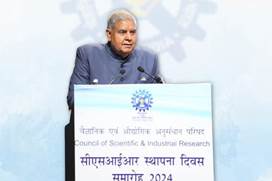
Dr Jitendra Singh, Hon’ble Minister of State (Independent Charge) S&T and Vice President, CSIR chaired the CSIR Society Meeting held on 27 March 2024 in New Delhi. Dr N. Kalaiselvi, DG, CSIR and Secretary, CSIR Society welcomed the Chairperson, members and others to the first meeting of the newly re-constituted CSIR Society w.e.f. 16 February 2023 and gave a detailed presentation on the Action Taken Report and key achievements of the CSIR since the previous CSIR Society Meeting held in October 2022. The Hon’ble Minister S&T, recounted many success stories of CSIR in the past year and said that S&T will play a pivotal role in India’s march to a Viksit Bharat 2047. Hon’ble Minister released a compendium of the “Women Entrepreneurs of CSIR Technologies” which showcases the strengths and R&D contributions of CSIR in promoting women leadership not only in S&T but also in innovation driven entrepreneurship.
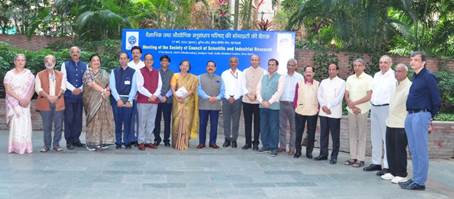
- CSIR’s Republic Day 2024 Tableau on Kartavya Path
The CSIR Tableau, highlighted the unleashing of a Purple Revolution ushered through Lavender cultivation in Jammu & Kashmir. The Tableau also showcased India’s first women friendly, compact, Electric Tractor developed by CSIR. The visually enchanting Tableau aligned with the Viksit Bharat theme of the Republic Day Parade 2024.

- CSIR-IIP's Sustainable Aviation Fuel Powered the IAF’s Dornier Aircrafts for Republic Day Flypast
At the Republic Day 2024 flypast, two Dornier 228s aircrafts powered by the sustainable aviation fuel (SAF) produced by the CSIR-Indian Institute of Petroleum (CSIR-IIP), took to the skies in historic ‘Tangail formation’.
- Foundation Stone Laid for India's First "Science Experience Centre" at CSIR-IICT, Hyderabad
Dr. Jitendra Singh,Hon’ble Union Minister of State (Independent Charge) Science & Technology, along with Shri G. Kishan Reddy, Hon’ble Union Minister of Tourism, Culture and Development of North Eastern Region (DoNER), laid the foundation stone of the first-ever Science Experience Centre and an exclusive "Biofuel Centre" in the premises of CSIR-IICT, Hyderabad. The Science Experience Centre (SEC) has been set up by the CSIR and the National Council of Science Museums (NCSM), Ministry of Culture. The SEC is primarily engaged in spreading the culture of science in the society, especially among students, with a motto of 'Communicating Science to Empower People' by developing Exhibits/Exhibition/Galleries etc. and also organizing Interactive Science Education programs.
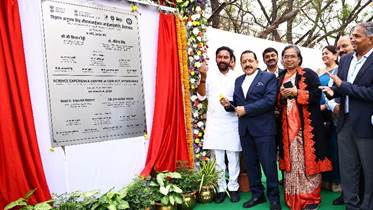
- India’s biggest Climate Clock activated at CSIR Headquarters to celebrate Earth Day
CSIR, as a part of the Earth Day Celebrations, installed and activated India’s biggest Climate Clock on the CSIR Headquarters, AnusandhanBhawan Building in Rafi Marg, New Delhi on 23 April 2024. The event signifies CSIR’s aim to spread awareness about climate change and its ill effects. Dr N Kalaiselvi, DG, CSIR, said that Earth Day is a reminder for us to protect the environment. She informed that under the CSIR-Energy Swaraj Foundation MoU, a large number of scientists and staff in CSIR has undergone the Energy Literacy Training. Climate clocks provided by the Foundation have been installed in most CSIR labs.
- CSIR-EU Launches Co-Funding Initiative for MSCA Staff Exchanges
The Council of Scientific and Industrial Research, India and the European Union, on 27 August 2024, launched a new co-funding initiative for the Marie Skłodowska-Curie Actions (MSCA) Staff Exchanges, part of the EU’s research and innovation programme, Horizon Europe. Through this scheme, CSIR will top up selected MSCA Staff Exchanges projects, enabling its institutes to engage in joint research projects with European and international partners and second their scientific and technical staff to European research organisations for knowledge sharing and research activities. This will promote a balanced researcher mobility and long-term collaborations.
- CSIR-CFTRI Hosts National Nutrition Week 2024
CSIR-CFTRI hosted the National Nutrition Week (NNW) from 1 - 7September2024. The theme for the 2024 NNW was "Nutritious Diets for Everyone".
- CSIR OWOT Curtain Raiser Organised
CSIR, India launched its One week, One Theme (OWOT) Program on 24 June 2024. The curtain raiser function of OWOT was graced by Dr Jitendra Singh, Hon’ble Minister S&T. The objective of the program has been to make innovation inclusive for all and bring it closer to the stakeholders in order to empower common citizen by not limiting the science and technology to the lab. This initiative aims help in optimizing the resources of all CSIR labs working on similar theme project.
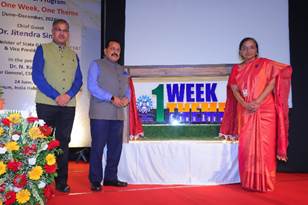
- Hon’ble Minister, Dr. Jitendra Singh inaugurates the Golden Jubilee of CSIR-NIIST
Hon’ble Minister, Dr. Jitendra Singh inaugurated theGolden Jubilee Milestone Observations Ceremony of CSIR-NIIST, Thiruvananthapuramon 17October 2024. Hon’ble Minister also released CSIR-NIIST golden jubilee year book and stamp, as part of the event and inaugurated the Centre of Excellence in Performance Chemicals and Sustainable Polymers and laid the foundation stone for Centre of Excellence in Ayurveda Research.
- CSIR organized IISF 2024 in IIT Guwahati
The 10th edition of the India International Science Festival (IISF-2024) held at IIT Guwahati was inaugurated by Dr Jitendra Singh, Hon’ble Minister S&T and DrHimantaBiswaSarma, Hon’ble Chief Minister, Assam, on 30 November 2024. The IISF-2024 was the first IISF organised in the North East India and was coordinated by CSIR-NIIST, Thiruvananthapuram as the nodal coordinator, in association with Science Departments under the Ministry of S&T, Ministry of Earth Sciences and VijnanaBharati.
- Release of the compilation on ‘Start-ups Catalyzed by CSIR’
Dr Jitendra Singh, Hon’ble Minister S&T along with Prof. Ajay Kumar Sood, PSA to the GoI, Dr. V. K. Saraswat, Hon’ble Member, NITI Aayog, and Dr. N. Kalaiselvi, DG, CSIR, released a special compilation titled "Start-ups Catalyzed by CSIR" on 30 November 2024 at IISF-2024. The book highlights the role of CSIR in fostering innovation and supporting start-ups in various sectors, contributing to India's growing innovation ecosystem.
- CSIR JIGYASA EPIC Hackathon 2024
CSIR launched Empowering Pupil Innovation and Creativity (EPIC)Hackathon on 5January 2024 under CSIR’s JIGYASA programme with an aim to provide a platform to budding youngstudents to pursue their innovation as well as nurture their potential in developing innovative solutions to address the challenges in the country through science and technology. The finale of the CSIR Jigyasa EPIC Hackathon 2024 was organised on 20December 2024 at the CSIR-IGIB, South Campus, New Delhi.Total 35 teams and 48 students participated in two-month summer internship at 18 CSIR laboratories across the countryheld under the Hackathon. On the finale event,29 students presented their research projectsdone during the summer internship. The winners of the CSIR EPIC Hackathon 2024 were felicitated with prizes and certificates.
MoUsSigning andCollaborations
The collaborative project between CSIR-NGRI and Geological Survey of India (GSI), focusses on a comprehensive ‘Deep Seismic Reflection Survey (DSRS) and Magnetotelluric (MT) Survey’, spanning 700 kilometres across Rajasthan and Madhya Pradesh, to study the intricate crustal architecture and unlock the region’s latent mineral potential.
Airbus has inked an MoU with CSIR-IIP to develop new technology pathways as well as test and qualify indigenous sustainable aviation fuel (SAF) in India. The collaboration will address the Indian aerospace industry’s decarbonisation ambitions by supporting SAF production and commercialisation, using a new HEFA technology pathway and locally sourced feedstocks.
The CSIR-Human Resource Development Centre (CSIR-HRDC), Ghaziabad (UP) signed a collaborative MoU with M/s Agriculture Skill Council of India (ASCI), Capital Goods & Strategic Skill Council (CGSSC), Hydrocarbon Sector Skill Council (HSSC) and Life Sciences Sector Skill Development Council (LSSSDC). The MoU envisages to create an enabling environment for CSIR and Indian industry.
CSIR-CCMB has forged an alliance with BlockchainFor Impact (BFI) under the BFI-Biome Virtual Network Program to accelerate biomedical research and innovation in the country.Under this program, BFI will allocate over US$ 600,000 during the course of three years and leverage the state-of-the-art facilities and expertise at CSIR-CCMB to support interdisciplinary and collaborative translational research projects in the field of biomedical science and innovation.
- CSIR-IMMT & CSIR-NGRI Signed MoUs with KABIL for Technical Cooperation in Critical Minerals Sectors
KhanijBidesh India Limited (KABIL) signed a Memorandum of Understanding (MoU) with the CSIR-NGRI and CSIR-IMMT to foster a long-term collaboration in the field of geophysical investigations to bolster its ongoing projects and activities in critical and strategic minerals.
- CSIR-NPL Partners with DEAL-DRDO, IIT Delhi, and VikasLifecare for Advanced Nano Composite Development
CSIR-National Physical Laboratory (CSIR-NPL) has collaborated with VikasLifecare, DEAL-DRDO, and IIT Delhi, to develop advanced Nano Composites.The strategic collaboration focuses on creating Nano composites for EMI shielding across various electronic and communication devices.A Non-Disclosure Agreement (NDA) has been signed to formalize the partnership.The primary aim is to optimize production techniques and produce high-performance materials for diverse commercial, military, and scientific applications.
- CSIR-NGRI Partners with NRSC-ISRO for Himalayan Earthquake Research
CSIR-NGRI and ISRO's National Remote Sensing Centre (NRSC) signed an MoU to investigate tectonic strain buildup in the Himalayan region.The partnership will focus on detailed seismic hazard assessment using ground-based GPS and satellite observations.The collaboration aims to produce high-resolution images of crustal deformation in the western Himalayas.This research is crucial for understanding and mitigating earthquake risks in the Himalayan region.
- CSIR-IITR Collaborates on Food Safety and Standards Authority of India’s (FSSAI’s) Microplastic Contamination Project
CSIR-Indian Institute of Toxicology Research (CSIR-IITR), ICAR-Central Institute of Fisheries Technology, and the Birla Institute of Technology and Science (Pilani) have collaborated with the Food Safety and Standards Authority of India (FSSAI) for project to tackle the growing concern of microplastic contamination in food. The primary objectives of the project include developing standard protocols for micro/nano-plastic analysis, conducting intra- and inter-laboratory comparisons, and generating critical data on microplastic exposure levels among consumers.
- CSIR and LaghuUdyogBharati Sign MoU to Transfer Technologies to MSMEs
CSIR and LaghuUdyogBharati (LUB) signed an MoU on 21 August 2024, to facilitate the transfer of selected CSIR technologies to Micro and Small Entrepreneurs.The MoU aims to transfer 100 CSIR technologies to identified MSMEs within 100 days, alongside addressing ideas and challenges proposed by MSMEs for technological development.Technologies like Pesticide Detection Kits, Multi-copter Drones, and Air Quality Monitoring Systems were among those transferred to companies from six CSIR labs.
- Zydus ties up with CSIR-CDRI to develop drug for CKD-induced osteoporosis
A collaborative research agreement was signed betweenZydus Lifesciences Ltd, Ahmedabad and CSIR-CDRI, Lucknow, to develop oral medication through the discovery of small molecule inhibitors of Sclerostin, for chronic kidney disease induced osteoporosis. Under this agreement, CSIR-CDRI and Zydus will jointly undertake preclinical research.
- CSIR and AIIMS, New Delhi Signed MoU for Collaborative Research in Healthcare Domain
The Council of Scientific and Industrial Research (CSIR), New Delhi and All India Institute of Medical Sciences (AIIMS), New Delhi signed an MoU on 17December 2024 at AIIMS, New Delhi aimed to provide a formal basis for initiating interaction between the two organizations to harness their respective strengths to advance medical research, enhance healthcare delivery, and tackle critical health challenges in India through the collaboration. This strategic partnership marks a significant step forward in leveraging combined expertise and resources to address critical healthcare challenges and innovate solutions for improved patient outcomes.
Awards and Accolades
- Three CSIR Scientists awarded with RashtriyaVigyanPuraskar 2024
The inaugural RashtriyaVigyanPuraskar ceremony was held in RashtrapatiBhavan, with Hon’ble President Smt. DroupadiMurmu presenting the awards on 22 August 2024. The process for the ceremony was coordinated by CSIR-Human Resource Development (CSIR-HRDG) under the guidance of Hon’ble Minister of S&T and Principal Scientific Advisor to GoI. Awards were presented under categories as VigyanRatna, Vigyan Shri, VigyanYuva-Shanti SwarupBhatnagar and Vigyan Team. Three CSIR Scientists were awarded during the ceremony. Dr. C. Anandharamakrishnan, CSIR-NIIST, and Prof. Syed Wajih Ahmad Naqvi, CSIR-NBRI, were awarded the Vigyan Shri and Dr. Abhilash, CSIR-NML was awarded with VigyanYuva-Shanti SwarupBhatnagar.
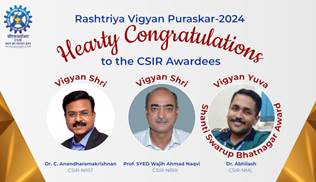
- CSIR-NGRI's Dr. Bantu Prasanta Kumar Patro Receives National Geoscience Award 2023
- Five distinguished scientists from CSIR-NEIST, Jorhat have been recognized among the top 2% of scientists worldwide.
- CSIR-CFTRI’s Scientist, Dr.Pushpa S. Murthy receivesKalpana Chawla Award
- CSIR-CRRI Director Prof. ManoranjanParida Elected President of IRC
- Dr. Anandharamakrishnan C, Director, CSIR-NIIST selected for the Tata Transformation Prize
- CSIR-NML’s Scientist, Dr. Biraj Kumar Sahoo Receives ‘Young Metallurgist Award 2023’
- CSIR Pavilion won the ‘Best Pavilion in the Expo’ Award at the Mega S&T Expo of IISF 2023 andSci-Tech Expo of IISF-2024.
*****
NKR/KS
(रिलीज़ आईडी: 2088289)
आगंतुक पटल : 10160